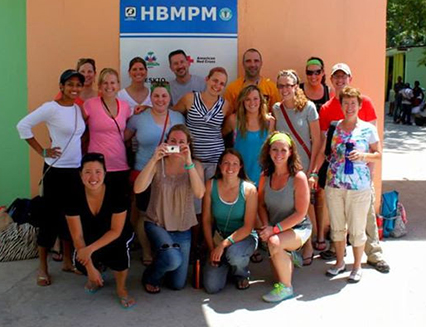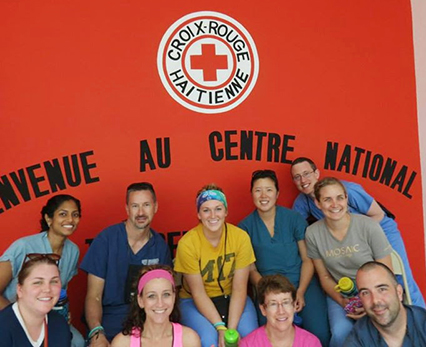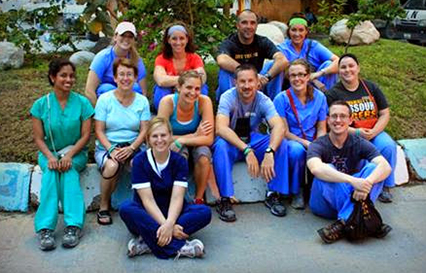
Volunteering presents great opportunities for personal and professional growth and is beneficial for RTs in all career stages.
Passion for caring
Like many RTs, a passion for caring for others led me to pursue a career in respiratory care. I learned fairly early in my career that it can be difficult to maintain a high level of compassion for every shift, every patient, day after day. Stress, fatigue, and long work hours contribute to burnout for many healthcare providers.
High levels of burnout and compassion fatigue aren’t new to respiratory therapists, but volunteering helped me fight it. Getting involved in international medical trips refueled my passion for caring for patients and reinvigorated my energy to do the best job I could every day for my patients.
Reset your priorities
Volunteering resets your priorities and your personal and professional perspectives. It’s hard to feel sorry for yourself when you’re standing in front of a person struggling to find clean drinking water for her children.



On a medical trip to Haiti, I learned to work with a healthcare team that I had just met in the airport. We cared for patients in a stressful environment without being familiar with each other’s skill sets, strengths, or weaknesses. We learned, very quickly, to trust each other as we encountered unique medical emergencies in a resource-poor environment complicated by with the added challenge of a language barrier.
Learning your strengths
By stepping out of my comfort zone and working with professionals who had been strangers just a couple days before, I learned my strengths that made me a better coworker and that I could share as a preceptor of new RTs. I cemented old skills and learned new skills by teaching Haitian healthcare providers about respiratory care.
Most importantly, international medical trips have an uncanny way to outline your weaknesses. We all know communication is the key to success, but it’s easy to take it for granted.
At home, my coworkers and I anticipated each other’s next move with limited verbal communication. If a delivery wasn’t going well, just the look on a nurse’s face told me it was time to set up intubation supplies. Haiti taught me essential skills to communicate clearly in an emergency through Haitian-Creole, French, English, and, sometimes the easiest, hand signals.
Make it meaningful
The most important aspect of volunteering is to find an opportunity that is personally meaningful.
International medical trips aren’t a good fit for all professionals. The time, expenses, or potential safety risks involved may discourage some from volunteering internationally.
On a local level, volunteering in my community outside of the medical profession taught me patience and the importance of being flexible. The skill set I used as a respiratory therapist was not always needed when volunteering locally with a community health promotion organization. This local organization needed help from volunteers in grant writing, which required me to learn something new. Being flexible allowed me to learn and help my community.
Whether you’re looking locally or internationally, the opportunities to volunteer are endless.
Enhance your resume
For RT students and recent graduates, volunteering boosts a resume’s power and increases the chances of catching a potential employer’s interest. Listing volunteer experience on a resume offsets any gaps in employment or experience, particularly for younger professionals with limited job experience to list on a resume.
For RTs in all career stages, listing volunteer work on a resume shows initiative and dedication. Volunteering provides the opportunity to practice and perfect skills, such as time management, the ability to work as a member of a team, and professional communication.
Regardless of where your career goes in the future or which volunteer opportunity is right for you, these interpersonal and professional skills easily crossover from volunteering to professional life. These same principles apply for mid-career RTs looking for a job change or advancement, but may have limited direct experience.
Broaden your network
Time spent volunteering overflows with priceless networking opportunities. Networking with like-minded professionals strengthens professional skills and lays the foundation for a career pathway in the future.
Volunteering with professionals from different fields provides a chance to learn from a diverse group of individuals who may not otherwise be encountered.
Volunteering, even if the opportunity isn’t respiratory-related, benefits your personal and professional life.
What do you have to lose by getting involved and volunteering?
Kellie Carroll MPA, RRT, RRT-NPS, AE-C, worked at Women’s and Children’s Hospital in the University of Missouri Health Care system for four years, including three years as a transport respiratory therapist on the Children’s Hospital Critical Care Transport Service. She worked at Children’s Mercy Kansas City for three years as a critical care respiratory therapist and charge therapist. Currently, she is the Assessment Coordinator at the NBRC, while continuing to provide patient care at Children’s Mercy.